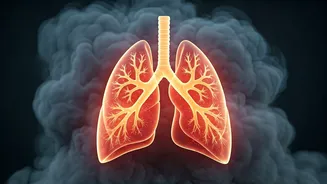A Growing Emergency
The air quality index (AQI) in Delhi has frequently spiked into the 'poor' or 'severe' range. This has spurred a growing concern that extends beyond mere
physical discomfort like scratchy throats and coughs. The thickening smog has triggered panic attacks, leading medical professionals to declare a combined mind-and-body emergency. Diwali celebrations in Delhi on Monday, October 20, 2025, saw the AQI at 345 (very poor). The capital city recorded an AQI of 275 (poor) on Friday, with previous readings of 305 (very poor) on Thursday, 353 (very poor) on Wednesday, and 350 (very poor) on Tuesday, showing a trend of consistently poor air quality.
The Pollution Pathway
The effects of air pollution on lungs and hearts have been a central focus. However, recent research reveals a subtle yet surprising consequence of air pollution: its impact on mental health. Exposure to fine particulate matter (PM2.5) and nitrogen dioxide (NO2) increases the risk of anxiety disorders. People in polluted urban areas are also more prone to feeling nervous, restless, and emotionally unwell. Researchers suggest that pollutants penetrate deep into the lungs and enter the bloodstream. These pollutants then travel to the brain, leading to psychological distress and potentially triggering panic attacks, especially for those experiencing respiratory symptoms like cough or a feeling of suffocation.
Protecting Your Health
In light of the escalating health risks posed by Delhi's air pollution, various protective measures are crucial. The article urges residents to regularly monitor the AQI and take corresponding actions. Wearing masks is a fundamental step to reduce exposure to harmful pollutants. Additionally, employing calming techniques is essential to manage potential panic attacks and emotional distress. This proactive approach helps safeguard both lung health and mental well-being in the face of this environmental challenge. Focusing on these strategies provides a practical way to face the situation.
























